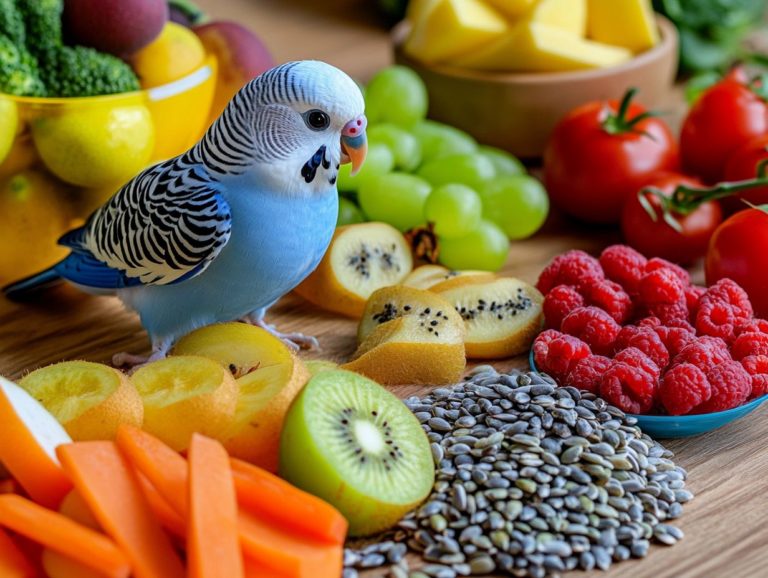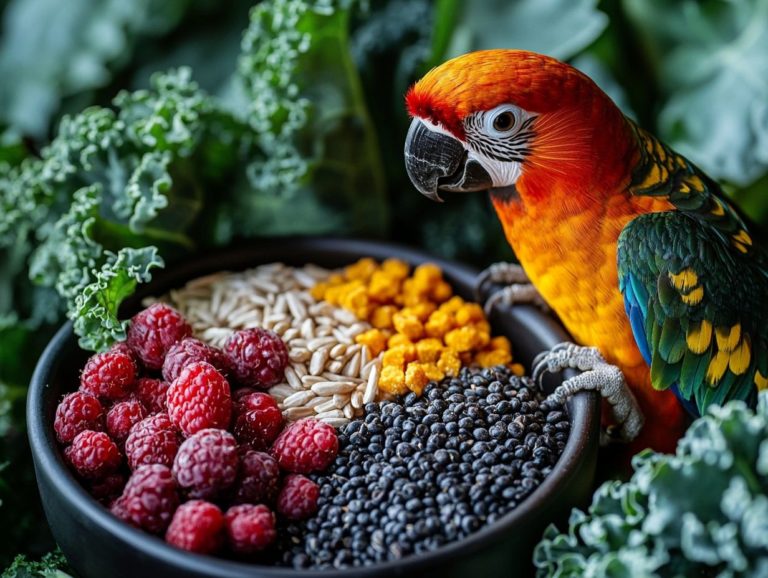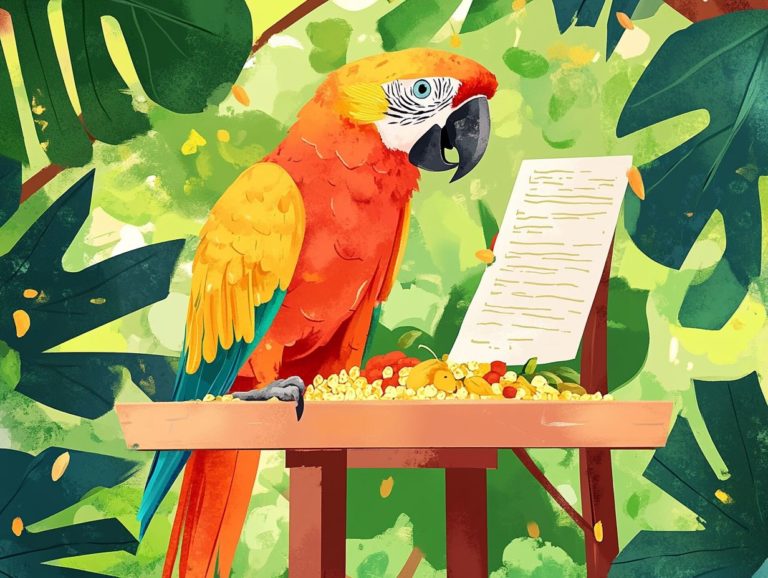How to Manage Obesity in Pet Birds
Did you know that obesity is a growing concern for pet birds? It’s an increasingly pressing issue among bird owners, often slipping under the radar until significant health complications emerge.
Recognizing the underlying causes and identifying the physical signs and symptoms is essential for facilitating early intervention. This article delves into the health risks tied to obesity, outlines effective management strategies including dietary and exercise recommendations and offers practical tips for prevention.
By taking a proactive approach, you can help ensure that your feathered companion enjoys a long, healthy, and joyful life.
Contents
- Key Takeaways:
- Understanding the Causes
- Identifying Obesity in Pet Birds
- Health Risks Associated with Obesity in Pet Birds
- Managing Obesity in Pet Birds
- Preventing Obesity in Pet Birds
- Frequently Asked Questions
- What is obesity in pet birds?
- What are the signs of obesity in pet birds?
- How can I prevent obesity in my pet bird?
- Can exercise help manage obesity in pet birds?
- What health problems can arise from obesity in pet birds?
- Are there any weight management diets for pet birds?
- How often should I exercise my pet bird?
Key Takeaways:
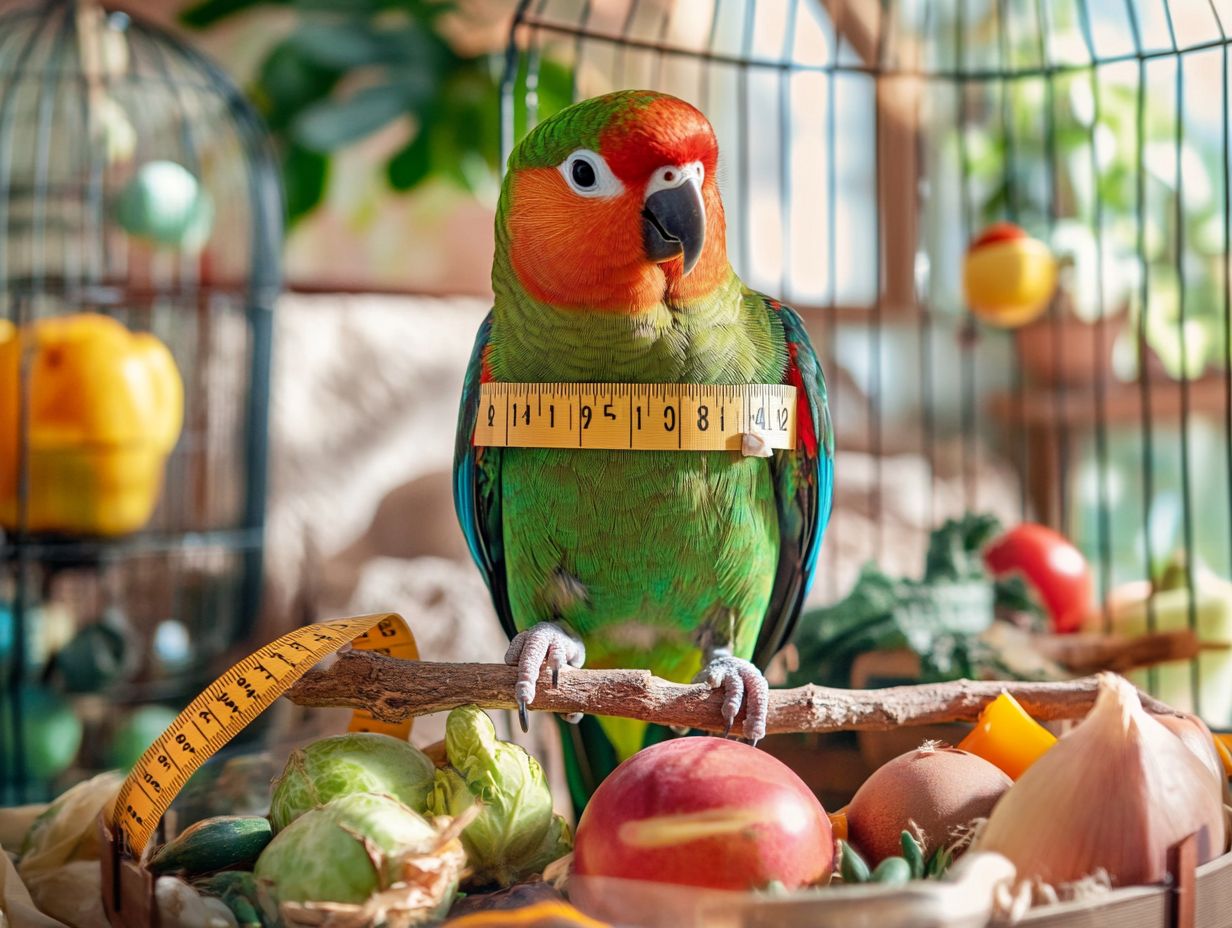
- Monitor your pet bird’s diet and exercise regularly to prevent and manage obesity-related health concerns.
- Be aware of the physical signs and health risks associated with obesity in pet birds.
- Take preventive measures such as offering a balanced diet and providing opportunities for physical activity to maintain a healthy weight for your pet bird.
Understanding the Causes
Understanding the causes of obesity in pet birds is essential for any devoted pet owner seeking to ensure the health and well-being of their feathered companions. Factors such as high-fat diets, insufficient exercise, and nutritional deficiencies can lead to serious health issues, including fatty liver disease and iron storage disease.
Behavioral changes in your pet bird can signal underlying health concerns. This shows how important it is to closely monitor their feeding habits.
Consulting with an avian veterinarian (a bird doctor) can offer invaluable insights into optimal nutrition and effective weight management strategies. This empowers you to safeguard your bird s health for the long term with veterinary advice.
Identifying Obesity in Pet Birds
Identifying obesity in pet birds is an essential aspect of health monitoring that you should prioritize as a responsible pet owner. Being attuned to physical signs and symptoms such as excessive weight gain, shifts in feeding habits, and reduced activity levels can empower you to detect obesity early.
Regular veterinary check-ups and consultations with an avian veterinarian will enable you to assess your bird’s weight and nutritional needs effectively. This ensures a long and healthy life for your feathered friend while monitoring for nutritional concerns.
Physical Signs and Symptoms
Physical signs and symptoms of obesity in your pet birds can be subtle, yet they serve as crucial indicators of their overall health. Common symptoms include an increase in body mass, difficulty in flight, and changes in feeding behavior, leading to serious health concerns like fatty liver disease, respiratory problems, and liver failure.
Along with these signs, the plumage of overweight birds may appear dull or ruffled, often due to their inability to preen effectively. You may also observe excessive fat deposits around the abdomen and base of the tail.
Nutritional deficiencies frequently accompany obesity. An overindulgence in high-fat diet items like seeds and nuts can overshadow their essential needs for vitamins and minerals. Prioritizing proper pet bird care means emphasizing a balanced diet that includes fresh fruits and vegetables, along with appropriate vitamin supplements to enhance their health.
This approach not only helps maintain an optimal weight but also promotes overall well-being, significantly reducing the risk of chronic conditions arising from obesity.
Health Risks Associated with Obesity in Pet Birds
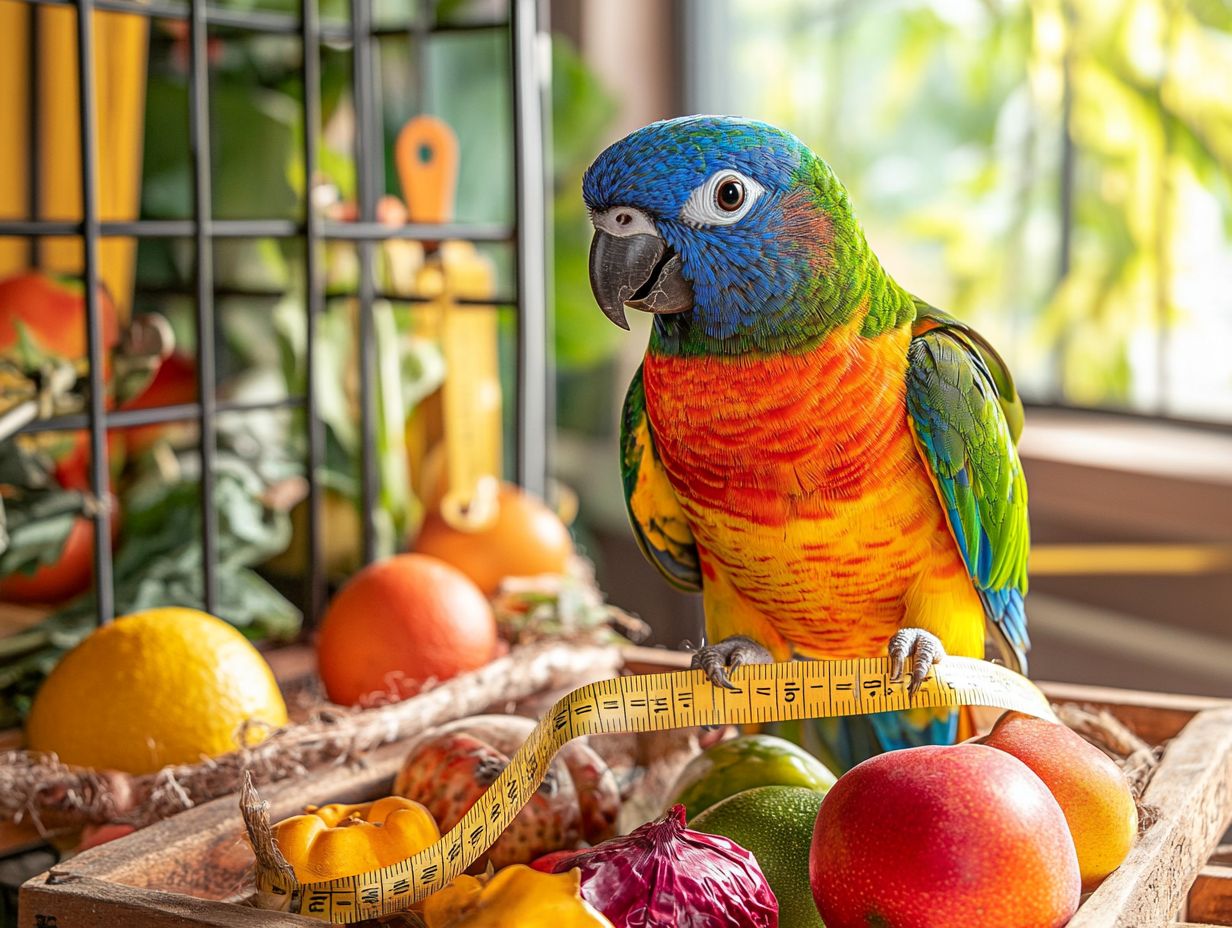
The health risks tied to obesity in pet birds can be quite serious. These risks potentially result in conditions such as fatty liver disease, respiratory issues, and even liver failure, underscoring the need for effective obesity treatment.
These obesity-related health challenges not only diminish the quality of life for your feathered friends but can also lead to premature death if not addressed in a timely manner. This highlights the importance of proper nutrition and health maintenance.
Grasping these risks is crucial for maintaining their health and ensuring their long-term wellbeing. Act now consult your veterinarian for personalized advice on managing your bird’s weight.
Potential Health Consequences
Potential health consequences stemming from obesity in pet birds can include a range of serious conditions, such as fatty liver disease, nutritional issues, and various other health issues. If not addressed through proper dietary modifications and regular health monitoring, including routine vet check-ups, these issues can severely affect your bird’s quality of life and longevity.
Obesity means more than extra weight. It can lead to serious health issues like heart disease, diabetes, and respiratory problems, emphasizing the importance of maintaining a healthy lifestyle.
When birds carry excess weight, their bodies endure increased stress, leading to fatigue and lower activity levels, worsening these issues.
Encouraging better eating habits can make a big difference! Incorporating fresh fruits and vegetables while limiting high-fat seeds and processed foods can be pivotal in reversing this trend and addressing issues like calcium imbalance and vitamin D deficiency.
By taking proactive measures now, you can significantly enhance your feathered companion’s well-being and extend their lifespan.
Managing Obesity in Pet Birds
Managing obesity in pet birds requires a thoughtful and comprehensive approach that encompasses dietary modifications, exercise regimens, and effective weight management strategies tailored to their specific diet needs.
It s crucial to provide a balanced diet specifically tailored to the unique nutritional needs of different bird species, such as Amazon parrots and macaws, to prevent and treat obesity effectively.
Incorporating vitamin supplements can also help, such as vitamin A and vitamin D, which contribute to maintaining their overall health and well-being.
Diet and Exercise Recommendations
Diet and exercise recommendations for managing obesity in pet birds center around providing a balanced diet that is rich in essential nutrients, paired with regular physical activity in their daily routine. To ensure proper health, consider learning how to monitor your bird’s weight and opting for formulated diets specifically designed for pet birds, like those from ZuPreem, which can effectively meet their nutritional needs while mitigating the risks associated with obesity.
By ensuring their diet includes a variety of seeds, pellets, fruits, and vegetables tailored to their specific requirements, you can significantly enhance the overall health of your feathered companions. For example, parrots thrive on a delightful mix of pellets and fresh foods, while canaries often benefit from a seed-based diet supplemented with leafy greens to support their health maintenance.
Along with dietary adjustments, introducing exercise routines like allowing flight time outside the cage, engaging them with interactive games, and providing climbing toys can substantially boost their fitness levels. Regular health monitoring, including weight checks and behavioral observations, is essential for identifying any changes, enabling timely adjustments to their care and ensuring effective obesity treatment.
Preventing Obesity in Pet Birds
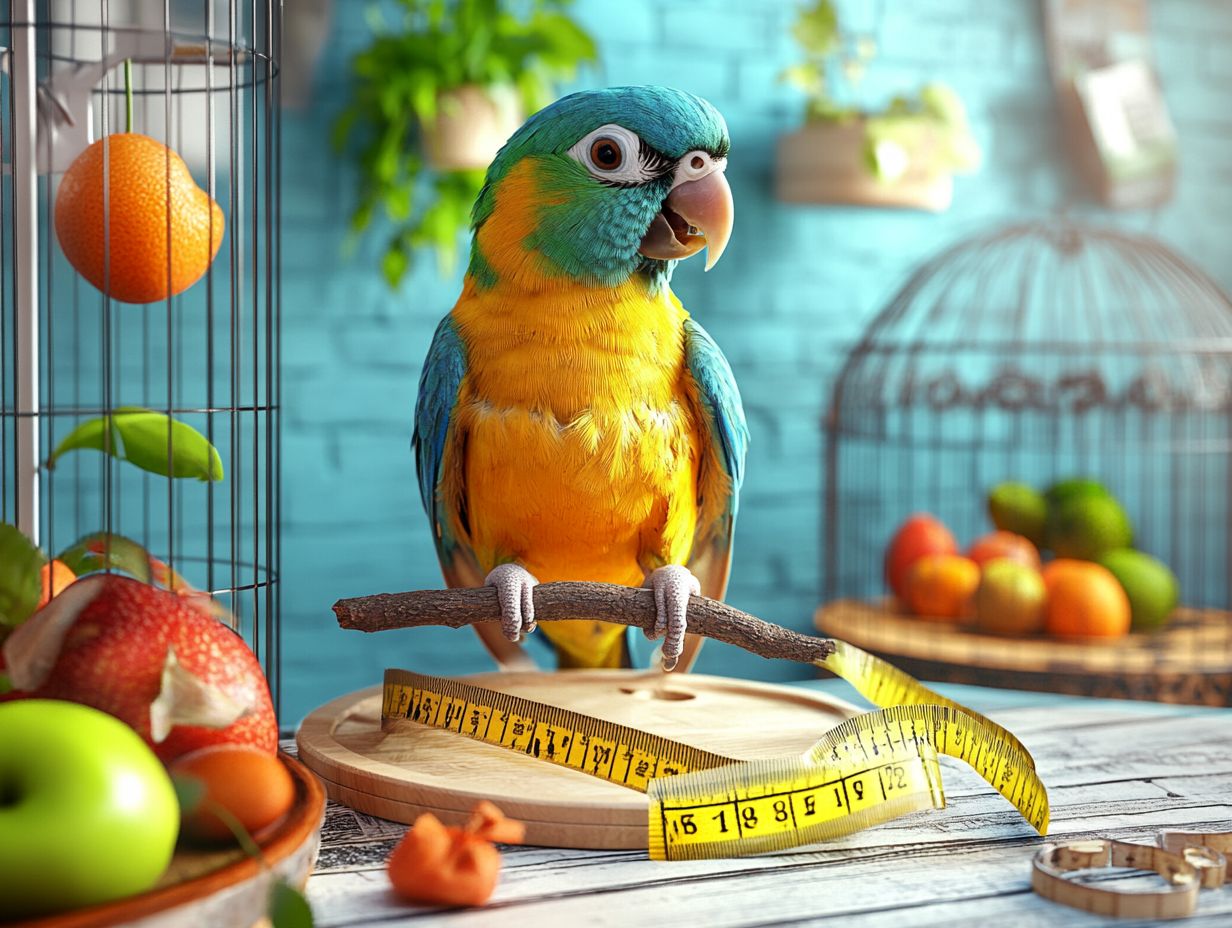
Preventing obesity in your pet birds demands a proactive approach that highlights the importance of proper nutrition, healthy feeding habits, and a consistent exercise routine, particularly tailored for different bird species.
As a pet owner, it s essential to familiarize yourself with dietary guidelines that ensure your avian companions receive a balanced diet suited to their specific species, thereby preventing calcium imbalances and other nutritional disorders.
Regularly monitoring their health and weight will empower you to make informed decisions, promoting their overall well-being.
Preventive Measures and Tips
Implementing preventive measures and tips for weight management can profoundly influence your pet bird’s health and longevity. By making simple adjustments to diet and daily exercise, you can effectively mitigate potential health concerns related to obesity. Act now to prevent obesity! Your bird’s health depends on it.
Opting for a balanced diet rich in important vitamins and minerals ensures that your feathered friend receives essential nutrients without the burden of unnecessary calories. Incorporating a variety of fresh fruits and vegetables not only spices up mealtime but also provides vital hydration, which is crucial for maintaining overall health.
Establishing a routine that includes regular flight time or engaging play sessions helps burn off excess energy. This contributes to a healthier weight and combats potential obesity causes.
Regular vet check-ups help monitor your pet’s weight and catch health issues early. This ensures your beloved avian companion thrives for years to come.
Frequently Asked Questions
What is obesity in pet birds?
Obesity in pet birds is a condition in which they have an excessive amount of body fat, usually due to overeating and lack of exercise. This can lead to serious health issues, such as liver disease, and should be managed properly.
What are the signs of obesity in pet birds?
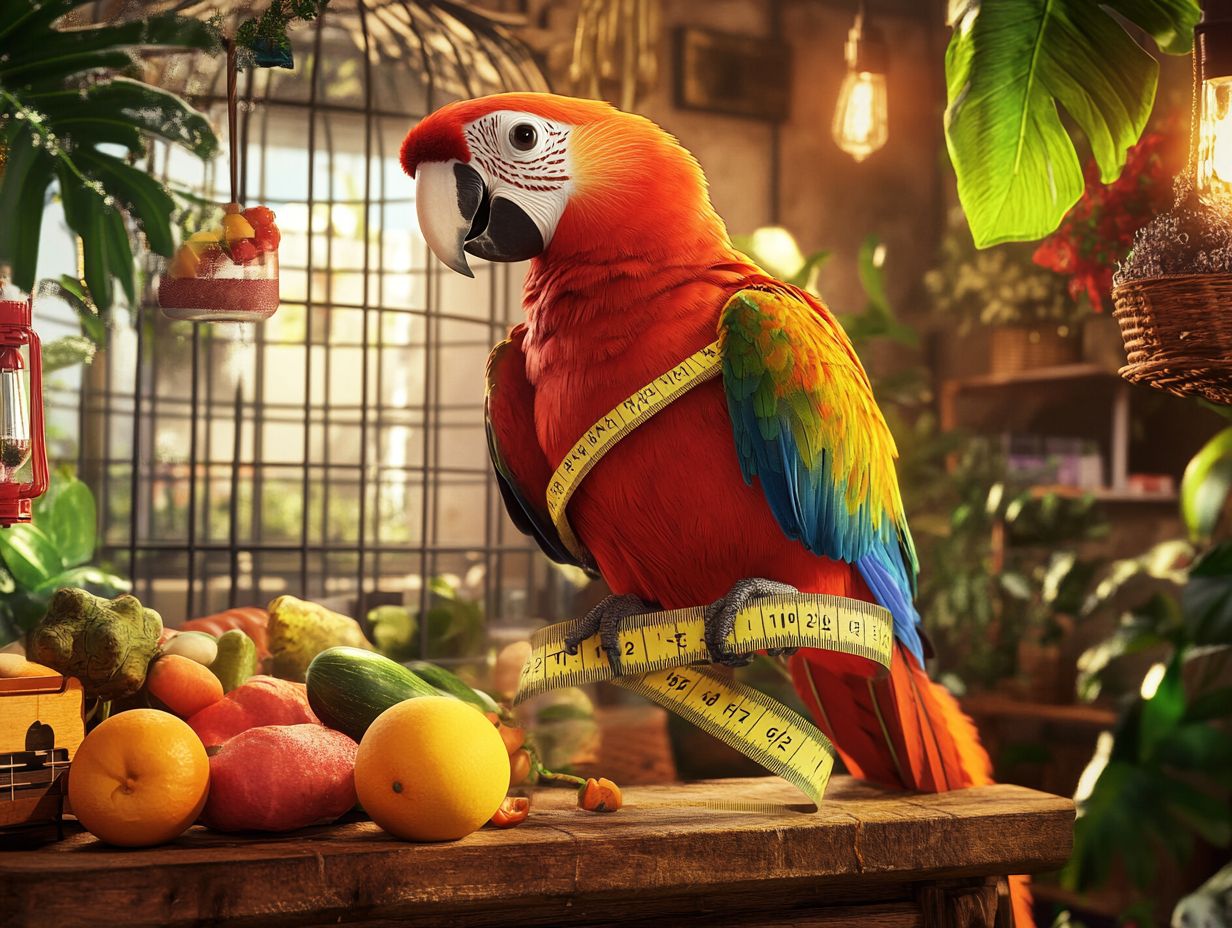
Signs of obesity in pet birds include difficulty flying or moving, a distended abdomen, and excessive fat deposits on the chest and hips. These signals indicate the need for dietary changes.
How can I prevent obesity in my pet bird?
To keep your pet bird healthy, provide a well-balanced diet and control their portion sizes! Regular exercise and playtime are also essential. Avoid giving them high-fat treats, limit their seed intake, and ensure they receive adequate nutritional needs.
Can exercise help manage obesity in pet birds?
Yes, exercise is essential for managing obesity in pet birds. Encourage your bird to fly and play by providing toys and creating a stimulating environment. Gradually increase the duration and intensity of exercise to help them lose weight. This makes exercise a key component of effective weight management.
What health problems can arise from obesity in pet birds?
Obesity can cause serious health issues in pet birds. These include heart disease, respiratory problems, liver disease, and joint pain. It can also decrease their lifespan and quality of life, highlighting the importance of proper nutrition and weight management.
Are there any weight management diets for pet birds?
Yes, there are specially formulated weight management diets available for pet birds that cater to the nutritional requirements of various bird species. These diets have a lower fat content and are designed to promote weight loss while still providing necessary nutrients, including important vitamins A and D. Consult with your avian veterinarian for the best diet plan for your bird, and consider dietary modifications that address obesity causes and health concerns related to nutritional deficiencies.
How often should I exercise my pet bird?
Regular exercise should be incorporated into your pet bird’s daily routine. Aim for at least 30 minutes of active play and flight time each day to help maintain their health and prevent obesity.


